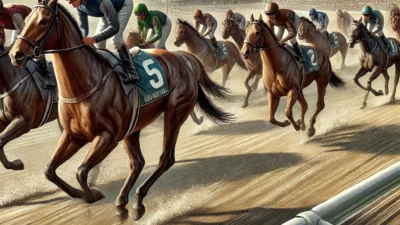The favorite-longshot bias in sports betting, where bettors overbet longshots and underbet favorites, has been widely examined across various markets (Daunhawer et al., 2017; Qiu, 2012; Kukuk & Winter, 2013). This phenomenon poses a challenge to traditional market efficiency theories, as consistent mispricing should theoretically be arbitraged away. However, empirical research shows that betting on favorites does not always result in losses, suggesting that inefficiencies persist despite market participants attempting to exploit them (Trumbull et al., 2000). The persistence of this bias has led to numerous theoretical explanations, including risk preferences, loss aversion, and mental accounting, where bettors perceive high-payoff, low-probability bets as more attractive than they actually are (Qiu, 2012; Potters & de Wit, 1996).
While traditional models attribute the bias to bettors’ risk-seeking behavior, recent research suggests that information-based models provide a more accurate explanation. These models take into account the complexity of bets and the varying levels of bettor information, arguing that systematic mispricing results from how bettors process and act upon available data (Sobel & Travis Raines, 2003). Interestingly, some studies propose that both longshot and favorite biases may coexist, depending on the number of potential outcomes within a given betting market (Newall & Cortis, 2021). This suggests that market structure plays a role in shaping how biases manifest, rather than a uniform psychological tendency across all bet types.
Another perspective challenges the notion that bettors are inherently risk-loving, instead arguing that misperceptions of probabilities drive the favorite-longshot bias (Snowberg & Wolfers, 2007). Bettors may systematically overestimate the likelihood of rare events while underestimating the probability of more frequent ones, leading to persistent odds distortions. Overall, the literature indicates that the presence and strength of the favorite-longshot bias vary across different betting contexts, influenced by factors such as market structure, bettor behavior, and information asymmetry.
The persistence of this bias has led to numerous theoretical explanations, including risk preferences, loss aversion, and mental accounting, where bettors perceive high-payoff, low-probability bets as more attractive than they actually are
Summary of: Qiu, 2012
Anecdote
Have a story to share? Write to us at research@bettingresearch.org if you have a related, personal experience you would like to see placed here and share with the community.
Articles Cited
- “Imant Daunhawer, David Schoch, Sven Kosub (2017): Biases in the Football Betting Market, https://doi.org/10.2139/ssrn.2977118
- This paper examines biases in football betting odds, specifically the favorite-longshot bias and the away-favorite bias, and whether betting strategies that exploit these biases can be profitable.”
- “Jianying Qiu (2012): Loss aversion and mental accounting: the favorite-longshot bias in parimutuel betting, https://doi.org/10.1080/00779954.2011.615116
- The paper examines how loss aversion and mental accounting can explain the favorite-longshot bias observed in parimutuel betting markets.”
- “M. Kukuk, S. Winter (2013): AN ALTERNATIVE EXPLANATION OF THE FAVORITE-LONGSHOT BIAS, https://doi.org/10.5750/JGBE.V2I2.532
- The paper proposes a new explanation for the favorite-longshot bias in horse race betting markets, which is that bettors have only noisy estimates of the true winning probabilities of the horses, rather than the commonly assumed explanation of bettors having a preference for risk.”
- “Bill Trumbull, Ron Balvers, Thomas Garrett, Raymond Sauer, Gary Wagner, Ashley Lorance, William Grant Ziyu Luo, R. Sobel, S. Raines (2000): An Examination of the Empirical Derivatives of the Favorite-Longshot Bias in Racetrack Betting * Draft, –
- The paper examines the favorite-longshot bias in racetrack betting and tests two theoretical explanations for this bias, finding that an information-based model better explains the data than a risk preference model.”
- “J. Potters, Jorgen G. de Wit (1996): Bets and Bids: Favorite-Longshot Bias and Winner’s Curse, https://doi.org/10.2139/ssrn.2053
- The paper presents a model that explains the favorite-longshot bias in racetrack betting as a result of bettors’ myopic beliefs that fail to account for the information contained in the equilibrium odds, similar to the winner’s curse in common value auctions.”
- “R. Sobel, S. Travis Raines (2003): An examination of the empirical derivatives of the favourite-longshot bias in racetrack betting, https://doi.org/10.1080/00036840110111176
- The paper examines two theoretical explanations for the favorite-longshot bias in racetrack betting, finding that an information-based model better explains the data than the risk preference model.”
- “P. Newall, Dominic Cortis (2021): Are Sports Bettors Biased toward Longshots, Favorites, or Both? A Literature Review, https://doi.org/10.3390/RISKS9010022
- Sports bettors exhibit biases towards both longshot and favorite bets, with the type of bias depending on the structure of the betting market.”
- “E. Snowberg, J. Wolfers (2007): Explaining the Favorite-Longshot Bias : Is it Risk-Love or Misperceptions ? ∗, –
- The paper provides novel empirical tests to discriminate between the neoclassical and behavioral explanations for the favorite-longshot bias, finding evidence that the bias is driven by misperceptions of probability rather than risk-love.”
Insufficient Detail?
At times it is difficult to answer the question as there are not enough relevant published journal articles to relate. It could be that the topic is niche, there’s a significant edge (and researchers prefer not to publish), there is no edge or simply no one has thought to investigate.



